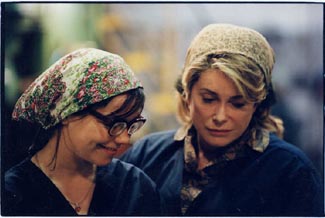
| The Razor's
Edge of American Cinema The New Sincerity of post-ironic films by Nicholas Rombes |
|
In 1967, Bonnie and Clyde could cause a stir because it seemed to throw audiences' sympathies on the side of the "wrong" characters, glorifying, or at least glamorizing, their bloody actions. In Pulp Fiction (1994), Mia describes Vincent as a square, making one with her fingers that appears in outline form on the screen, reminding us not to care because, after all, what we are watching is just a movie. In
her lengthy defense of Bonnie and Clyde against its critics,
the late Pauline Kael noted that perhaps audiences reacted so strongly
to the movie not because it was a cold, ironic portrayal What fascinates about Bonnie and Clyde over thirty years later isn't the shock of the violence, but rather how long it took to recapture that delicately playful and treacherous balance between irony and sincerity in American movies. This is even more difficult today, when movies (and video games) are made and marketed for both parents and their children, who consume the same films despite vastly different experiences. Watching a little bit of Ridley Scott's Alien (1979) with my ten-year old son, I had to turn it off not because of any specific individual scenes (he has seen much worse violence in Daredevil or even in his 007 Gamecube video game) but rather because of the relentlessly adult mood and sensibility of the film. How many recent science fiction films can you think of that have no kids in them? (Alien has none.) Until
recently, films by auteurist directors that asked audiences to treat
with sincerity their adult characters, such as Blue Velvet or
Eyes Wide Shut, were met by jaded critics who looked for
Yet this is no longer the case, and despite those who scoff at the summer of the remake, there is another strain of American film has quietly emerged, an experimental strain, where the intersections of sincerity and irony are explored in complex, and often beautiful, ways. The foundational films in this movement are Blue Velvet (1986), sex, lies, and videotape (1989), and Eyes Wide Shut (1999), where audiences' relationships to the characters are not clearly spelled out, and where any distancing we feel is compensated for my scenes of intense-even embarrassing-melodrama. The ur-text for all these films is Terrence Malick's Badlands (1973), whose surreal first line ("Give you a dollar to eat that collie") is spoken by Martin Sheen with total conviction and sincerity. Consider:
in 1976, there was nothing on television that approximated the violence
of Taxi Driver. Today, frequently network television shows (such
as CSI: Miami or NYPD Blue) outstrip most movies in
terms of violence. This shifting of violence from film to television
and cable and other cultural forms-such as song lyrics-has in many
ways marginalized the outlaw status of cinema. Part of the subversive
allure of Bonnie and Clyde was that it provided glimpses
of violence that weren't Here is an initial and partial mapping of recent significant contributions to the post-ironic movement: Magnolia (1999): Sprawling, decadent in its melodramatic weepiness, utilizing all the signature habits of postmodernism, yet without the attendant irony. The first film to bring widespread, mainstream attention to the New Sincerity. The Dogme 95 Movement and Its Offspring: Dancer in the Dark (2000) remains the most elusive, straddling the line between clinical detachment and melodrama so finely that the film almost defines a new, hybrid genre. It's the closest thing to a new language of cinema since Cassavetes's experiments in the 1960s. Muholland Drive: By chance the first post 9-11 film, if not in fact than in spirit. Premiering in Canada at the Toronto Film Festival in the days surrounding the attacks, its full color ads bleeding in the New York Times in the days before 9-11, the film captures more than any theory the element of resigned surprise at discovering that irony and sincerity are not mutually exclusive. The search for the mystery becomes the mystery itself; like Adaptation and Memento it is the telling of the story that the film glories in. Far From Heaven (2002): The fact that many reviewers entertained questions of the film's emotional core -- was it authentic or ironic? -- suggests that there is a growing awareness and self-consciousness about the habit of irony in the post-911 era. Adaptation (2002): The most aggressive example of postmodern self-reflexivity used in the service of a traditional romantic underdog movie. The Good Girl (2002): At first, you think it's a parody of white-trash losers-the overly lit blankness of the store's interior, the befuddled numbness of the characters-until builds identification so strongly that you begin to see the world from within the worldview of the characters, not without. McSweeney's: That word Heartbreaking in Dave Eggers's book A Heartbreaking Work of Staggering Genius (2000) is unironic; the book really is heartbreaking, and in its endlessly digressive defenses of itself in the paperback version, inaugurated a new form of public theory. McSweeney's, the literary quarterly founded by Eggers that sometimes comes in a box, sometimes wrapped in a rubberband, sometimes with an accompanying CD or DVD, continues the tradition of synthesizing the wild excesses of postmodern deconstruction while at the same time offering stories and tales that are often genuinely touching. Which is to say: it's harder and harder to preserve the mystery and strangeness of the world when it is so easily and quickly dispelled. In a sense, this is the final triumph of the Enlightenment: the banishment of myth. The risk in calling for a new aesthetics -- a new avant-garde -- that aims to reanimate that mystery is that such moves are inevitably labeled nostalgic or naïve. And yet isn't that what it means to be human, to risk pride by opening up to the possibility of mystery? This is harder to do today, when narrative itself is so easily disassembled and opened to scrutiny: after all, the entire logic of DVDs conspires to make a commodity not out of film, but of the process of making film. Anytime a culture looks too closely at how stories are made, the benefits of critique and skepticism are offset by irony and exhaustion. But this new breed of film has figured it out: audiences raised during the postmodern era already bring a sense of shared irony to the objects around them -- they no longer need someone like Tarantino to draw their squares on the screen for them.
-- Nicholas Rombes
Discuss this article on the nextPix FORUM by going to its discussion thread: [click here] Buy
the films mentioned in this article [click
here] |

| |
 |
Euro Screen Writers Articles on Euro film, research, plus a great cache of interviews with such directors as Godard, Besson, Agnieszka Holland, Peter Greenway, and Fritz Lang. |
 |
Done Deal: A current list of the latest industry script sales. |
 |
UK's Film Unlimited Truly unlimited, one of the best film sites going. Plenty of news, reviews, special reports, features, and PREVIEWS. |
 |
Screen Writer's Utopia! What are they, who wrote them, who's doing them, and what you can expect. |
 of
the outlaw heroes, but, on the contrary, because the film in fact
treated Bonnie and Clyde with humor, compassion, and humanity. In
other words, the ironic detachment that characterized movies of
the mid-1960s, especially Kubrick's Dr. Strangelove, which
portrayed everything in a kind of bleakly nihilistic, detached way,
gave way in Bonnie and Clyde to a sense that you could have
both: a level of ironic detachment buried within a larger story
that really and genuinely asked audiences to care about its characters.
of
the outlaw heroes, but, on the contrary, because the film in fact
treated Bonnie and Clyde with humor, compassion, and humanity. In
other words, the ironic detachment that characterized movies of
the mid-1960s, especially Kubrick's Dr. Strangelove, which
portrayed everything in a kind of bleakly nihilistic, detached way,
gave way in Bonnie and Clyde to a sense that you could have
both: a level of ironic detachment buried within a larger story
that really and genuinely asked audiences to care about its characters.
 the
subversive irony behind every façade and who scoffed at the outdated
sentimentality. Afraid that there was a joke that they weren't getting,
afraid that they (like the critics who misunderstood the appeal
of Bonnie and Clyde) might become irrelevant in the ironic
era of Quentin Tarantino, critics engaged in a frenzy of overcompensation,
for the greatest sin in the postmodern era was to be duped into
sincerity by an insincere artifact.
the
subversive irony behind every façade and who scoffed at the outdated
sentimentality. Afraid that there was a joke that they weren't getting,
afraid that they (like the critics who misunderstood the appeal
of Bonnie and Clyde) might become irrelevant in the ironic
era of Quentin Tarantino, critics engaged in a frenzy of overcompensation,
for the greatest sin in the postmodern era was to be duped into
sincerity by an insincere artifact.
 available elsewhere. Today, against the gutter nihilism of bands
like System of a Down or Tool, or the spectacular
violence of video games like Grand Theft Auto, how can movies
compete for notoriety? And yet, the defanging of movies since the
1960s has resulted in a rejuvenated form based on a secret: restraint,
too, can yield an avant-garde. Just like the Dogme 95 collective
blossomed in the face of self-imposed rules, so too the most radical
American cinema since the 1960s decades has flourished through restraint:
as television becomes more cynical and ironic, cinema finds great
power and experimentation in restraint.
available elsewhere. Today, against the gutter nihilism of bands
like System of a Down or Tool, or the spectacular
violence of video games like Grand Theft Auto, how can movies
compete for notoriety? And yet, the defanging of movies since the
1960s has resulted in a rejuvenated form based on a secret: restraint,
too, can yield an avant-garde. Just like the Dogme 95 collective
blossomed in the face of self-imposed rules, so too the most radical
American cinema since the 1960s decades has flourished through restraint:
as television becomes more cynical and ironic, cinema finds great
power and experimentation in restraint.
